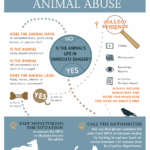Animal cruelty is a heinous act that goes beyond mere neglect; it is an erosion of the moral fabric of society. Just as a seedling struggles to thrive in parched soil, so too does the vulnerable population of animals suffer under the weight of human indifference. However, the power to instigate change rests within our hands. This article serves as a compass for those who wish to navigate the labyrinthine pathways of legal recourse against animal cruelty. By understanding where and how to file a complaint, individuals can become the guardians these silent beings so desperately need.
First and foremost, it is essential to grasp the scope of animal cruelty. This encompasses a wide range of behaviors, from outright abuse to neglect and exploitation. In many jurisdictions, the legal framework distinguishes between various forms of cruelty, ranging from misdemeanor offenses to severe felonies. Hence, understanding the nature of the offense is a prerequisite to taking action. Each grating sound of animal suffering calls us to respond, and knowing that your voice can catalyze justice is a profoundly empowering realization.
When faced with the disheartening sight of mistreatment, the initial instinct may lead a witness to act swiftly. However, it is paramount to proceed with caution and understanding. The first step in taking action is to gather as much evidence as possible. Documentation can take the form of photographs, videos, or written accounts detailing the circumstances surrounding the victimized animal. Just like a painter capturing a moment on canvas, this record will serve as a vital piece of your advocacy efforts, lending credence to your claims.
Once you have compiled your evidence, the next logical step is to identify the appropriate authority to whom you can direct your complaint. In most regions, local animal control agencies, humane societies, or wildlife organizations serve as the frontline defenders of animal welfare. These organizations possess the expertise and legal authority to investigate complaints of animal cruelty. Their role can be likened to that of a lighthouse, guiding lost souls safely to shore and illuminating the path toward justice.
If the local agencies do not yield satisfactory results, legal recourse may extend to the police department. Animal cruelty, particularly when it involves violence, often falls under the jurisdiction of law enforcement officials. Similarly, seeking assistance from animal welfare advocates can amplify your voice; they are the passionate warriors rallying for those who cannot speak for themselves. When you collaborate with these groups, you create a force of collective outrage that cannot be easily dismissed.
Furthermore, many jurisdictions have established hotlines specifically for reporting animal cruelty. These clandestine numbers allow individuals to convey their concerns anonymously. However, remember that anonymity, while prudent, should not serve as an excuse for inaction. Be vigilant; the life of an animal may hang in the balance. Just as a heartbeat reverberates through every crevice of the animal kingdom, each complaint you file beats with the potential for change.
In addition to local resources, the national regulatory bodies offer avenues for lodging complaints. For instance, in the United States, the Animal and Plant Health Inspection Service (APHIS) oversees compliance with the Animal Welfare Act. This comprehensive governance entity fortifies the legal frameworks that safeguard animals, making it a powerful ally in the fight against cruelty. Reports can often be submitted online or through dedicated phone lines, ensuring that your urgent message is delivered to those wielding the power to effectuate change.
As you plunge into the depths of these reporting channels, it is vital to remember your rights. Every individual holds the right to protect animals from cruelty under the veil of law. By reporting these offenses, you contribute not just to the welfare of a single creature but to the broader societal ethos that champions compassion over cruelty. Moreover, numerous states have enacted “Good Samaritan” laws that provide legal protection for those who report suspected cruelty in good faith. Therefore, fear of retribution should not stifle your conscience.
One might wonder: What can I do if my complaints fall on deaf ears? In this case, perseverance becomes your greatest ally. The journey to justice resembles a marathon rather than a sprint. If you notice a lack of action, follow up with the authorities and keep relentless pressure on the system. Writing letters, making phone calls, and attending city council meetings can galvanize the message that community members are invested in the welfare of animals. Just as the tide ebbs and flows, the momentum of your advocacy can gradually turn the wheel of justice.
In conclusion, the road to eradicating animal cruelty is fraught with complexities, yet the rewards of embarking upon this journey are immeasurable. Armed with knowledge and tenacity, you possess the ability to spur action against those who inflict harm on innocent beings. The quiet whispers of suffering animals demand our attention, and each complaint filed is a step toward dismantling the cruel indifference that diminishes humanity. Stand resolute. Advocate fiercely. Your voice can be the lifeline that countless animals so urgently seek.





